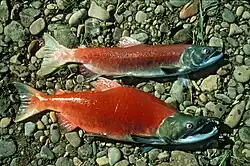нерка
Russian

Самка и самец нерки
Alternative forms
- ня́рка (njárka) — obsolete, dialectal
Etymology
Borrowed from Finnish nieriä into Russian during the colonization of the Kamchatka (end of 17th, beginning of 18th century) by Finnish-Russian bilinguals, + -ка (-ka) ending. The meaning of the Finnish word is fixed to “saibling” now but it did not need to be so at that time. Doublet of нериас (nerias), нериус (nerius), and не́ргас (nérgas), northwestern Russian dialectal forms borrowed from Karelian nieries.
Pronunciation
- IPA(key): [ˈnʲerkə]
Noun
не́рка • (nérka) f anim (genitive не́рки, nominative plural не́рки, genitive plural не́рок)
- sockeye salmon (Oncorhynchus nerka)
- Synonyms: кра́сная (krásnaja), кра́сница (krásnica)
Declension
Descendants
References
- Kendla, Mari (2014) “Über die Entstehung und Klassifizierung estnischer Fischbezeichnungen [On the Development and Categorization of Estonian Fish Names]”, in Linguistica Uralica (in German), volume 50, number 1, , pages 38–39
- Plevačová, Hermína (1978) “K slovanským výpůjčkám narikla, nerita, nerka, nanara ap. [About the Slavic loans narikla, nerita, nerka, nanara and so on]”, in Sborník prací Filozofické fakulty brněnské univerzity. A, Řada jazykovědná (in Czech), volumes A25-26, pages 87–91
This article is issued from Wiktionary. The text is licensed under Creative Commons - Attribution - Sharealike. Additional terms may apply for the media files.